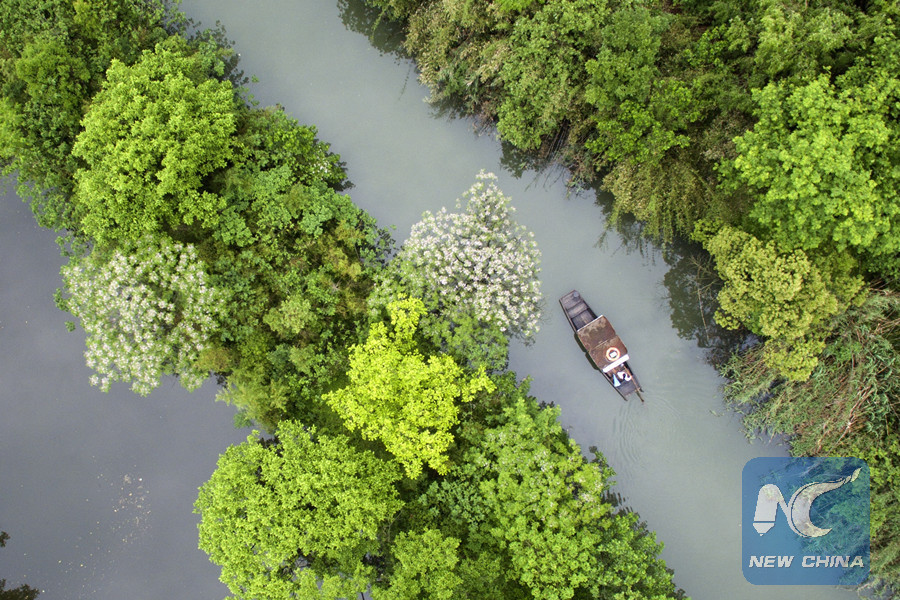
This aerial photo taken on May 12, 2016 shows the wetland of the West Lake in Hangzhou, capital of east China's Zhejiang Province. (Xinhua/Huang Zongzhi)
BEIJING, Aug. 25 (Xinhua) -- In east China's Hangzhou city, a land of beauty, delicacy and booming new economy, leaders of the world's 20 major economies, Group 20, will gather there for their annual summit early next month.
The city, praised by Italian traveler Marco Polo in the 13th century as "the world's most magnificent and noble city," is little-known compared with Beijing and Shanghai, but has much to offer and is a window on new trends in China.
LAND OF PARADISE
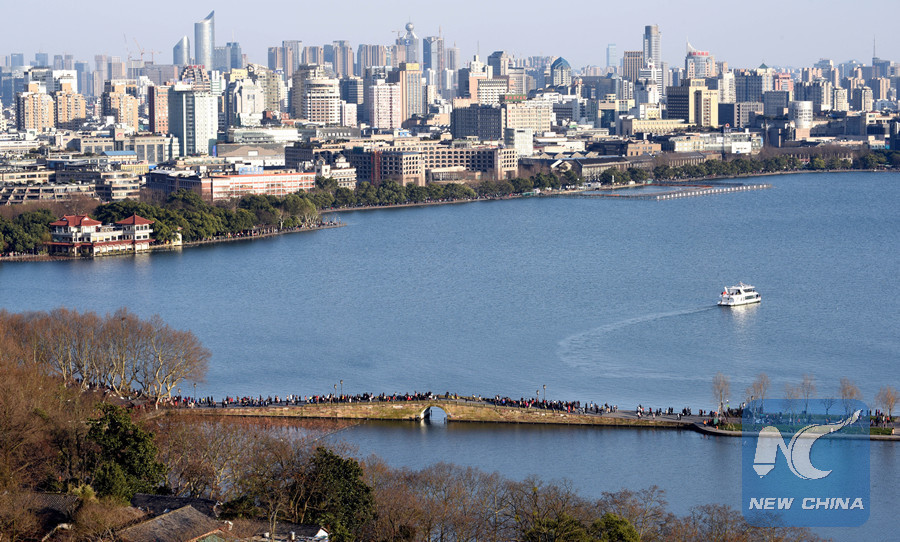
File photo taken on April 27, 2016 shows an aerial view of the West Lake in Hangzhou, east China's Zhejiang Province. (Xinhua/Wang Dingchang)
With a history of over 2,200 years, Hangzhou is known as one of China's seven ancient capitals. It boasts two world heritage sites: the West Lake and the Great Canal.
As the most renowned scenic spot, the West Lake has inspired generations of poets and painters throughout Chinese history. The two most popular love stories of China, "The Legend of the White Snake" and "Butterfly Lovers", both originated from Hangzhou.
The Great Canal, which goes all the way north from Hangzhou to Beijing, is still a vibrant shipping route as well as local residents' relaxing site. Take a boat and listen to the lapping of waves while passing under bridges one after another, you are experiencing one of the greatest pleasures a boat can give you. A leisure stroll through the Hefang Street in the old town would provide you a picture of the traditional culture and life in Hangzhou.
Thanks to its abundance of scenic attractions, Hangzhou has been awarded the title of "Oriental Capital of Leisure" by the World Leisure Organization, and "The Best Tourist City of China" by the National Tourism Administration.
DELICACIES
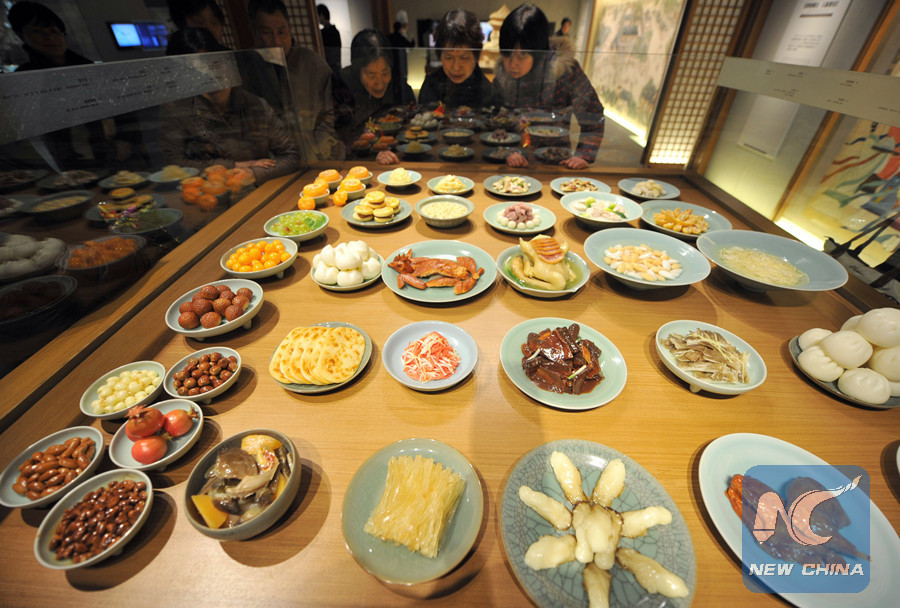
Visitors look at lifelike artificial dishes displayed at the Chinese Hangzhou Cuisine Museum in Hangzhou, capital of east China's Zhejiang Province, March 20, 2012. (Xinhua/Wang Dingchang)
A famous Chinese poet Su Shi, also known as Su Dongpo, praised nearly one thousand years ago that Hangzhou cuisine was the best banquet in the world. The most well-known Hangzhou cuisine Dongpo Pork is named after Su.
When dining in restaurants, there are some representative dishes that you must order: Beggar's Chicken, West Lake Grass Carp in Vinegar Sauce, Longjing Tea Shrimp, Sister Song's Fish Soup, West Lake Water Shield Soup and Braised Bamboo Shoots, to name just a few.
Besides these relatively formal cuisines, there are also local snacks worth trying. Here are some from a huge variety of local delicacies unique to Hangzhou that may entertain your taste buds: congbaohui, or fried dough sticks wrapped in thin pancake, Dingsheng cake, xiao long bao, or small steamed dumplings, Wushan pastry and spring roll.
BOOMING NEW ECONOMY
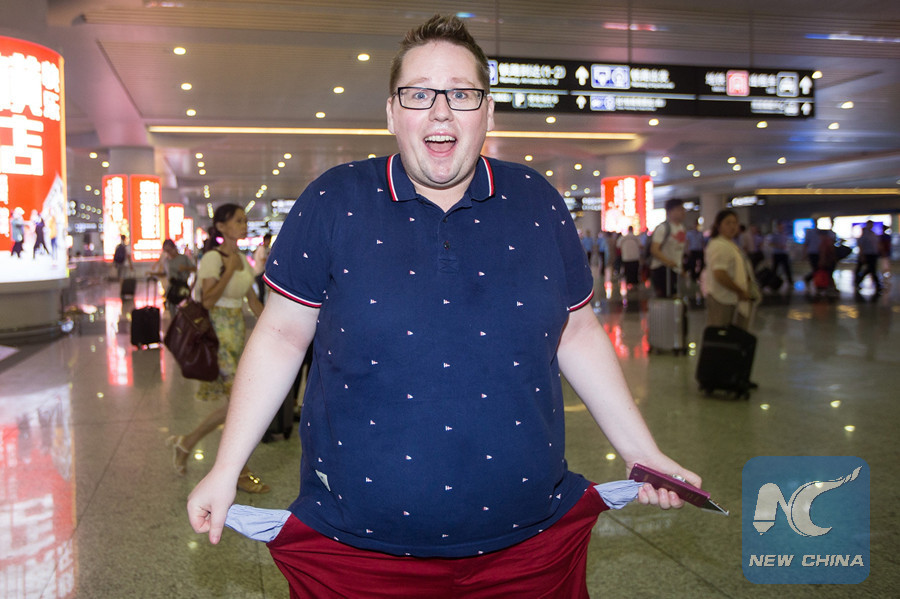
Thomas Dirksen from Germany shows his empty pocket after taking a bullet train to arrive in Hangzhou, capital of east China's Zhejiang Province, Aug. 22, 2016. (Xinhua/Xu Kangping)
If you have only one mobile phone and without any cash, in which city can you survive? The answer must be Hangzhou.
Thomas Dirksen, a German citizen who lives in Shanghai, has just finished his unforgettable day of living without cash or credit card in Hangzhou. Dirksen has used mobile pay on almost anything he encounters in Hangzhou: from shopping, ordering a meal, taking a cab to riding on a bus.
"I have been to more than 30 countries in the world, and none of the cities can be as convenient as Hangzhou. Even when you buy from a vendor on the street, mobile pay is available," said Dirksen.
According to the statistics released by Ant Financial Services Group, China's most valuable financial technology company, 98 percent of the cabs in Hangzhou can be paid through mobile phone, and Alipay, Alibaba's third-party online payment platform, is available at over 95 percent of the supermarkets and convenience stores.
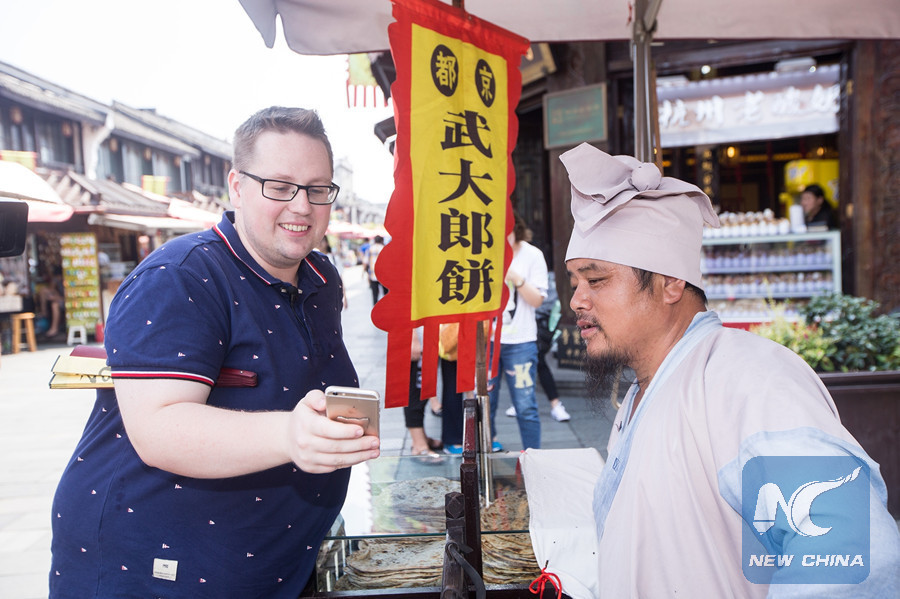
Thomas Dirksen from Germany uses his mobile phone to pay for a pancake in Hangzhou, capital of east China's Zhejiang Province, Aug. 22, 2016. (Xinhua/Xu Kangping)
Hangzhou's economy grew by 10.8 percent in H1, outpacing almost all major Chinese cities and well above the 6.7 percent registered by the country as a whole. Alibaba announced revenue growth of 59 percent in H1, the fast growth since raising 25 billion U.S. dollars in its 2014 IPO.
Thousands of other smaller online shopping businesses are clustered in the city. Two years ago there were 470,000 e-commerce businesses there, one seventh of China's total. Last year, China's online retailers made sales of 588 billion dollars, with 115 billion dollars reported in Zhejiang. In Hangzhou alone, cross-border e-commerce rocketed from less than 20 million dollars in 2014 to 3.5 billion dollars in 2015.
Inspired by the city's vibrancy, Bostonian Richard Jackson quit his job as an English teacher in 2015 and became communications manager in AI start-up Rokid.
"Hangzhou is establishing itself as a high-tech center. Rokid is a very good example of the new Hangzhou, and it shows the spirit of innovation-driven development," he said.
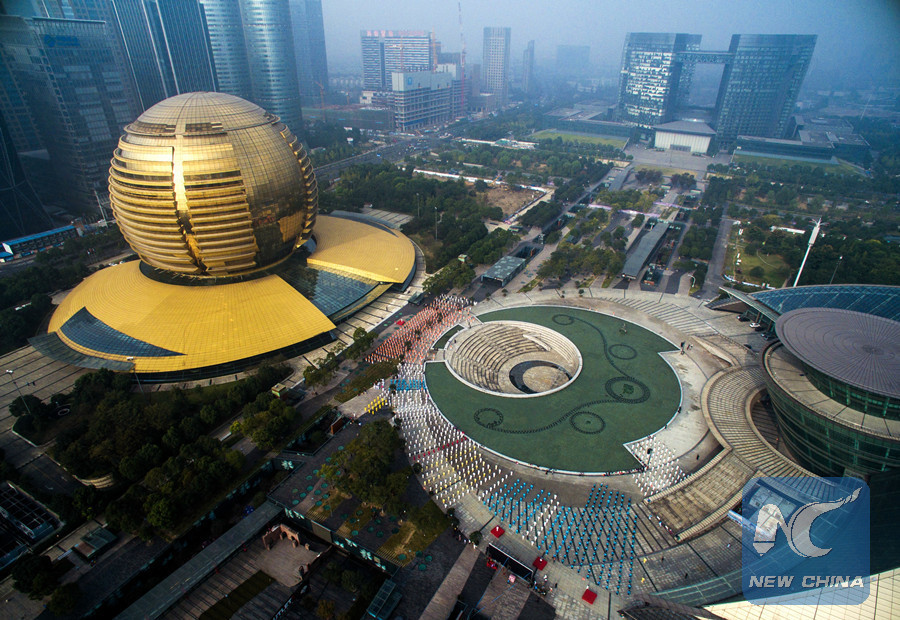
Photo taken on Oct. 22, 2015 shows the Qianjiang New CBD in Hangzhou, capital of east China's Zhejiang Province. (Xinhua/Xu Yu)
With the economy on fire and a long tradition of entrepreneurship, local magnates are taking the fight around the globe. Automaker Geely became a global name in 2010 when it bought the ailing Swedish brand Volvo from Ford for 1.8 billion dollars.
Today China's listed companies are targeting acquisitions in automobiles, electronics, chemicals and bio-medicine in Europe and North America. From 2012 to 2014, Chinese enterprises made 29 acquisitions in automobile, 10 of which were done by companies in Zhejiang.
"A major motive of overseas acquisitions by leading Zhejiang companies is to get their hands on the technology needed to increase value-added and move up the ladder," said Chen Feiqiong of Zhejiang University.
"The spillover effect will buoy up the local economy, essential for China to transform itself from the world's run-down factory to a modern manufacturing power by 2025, as the government plans," she said.

